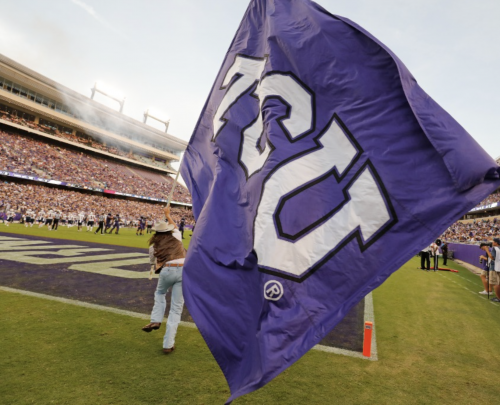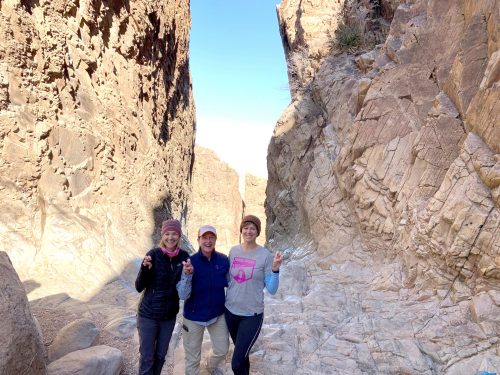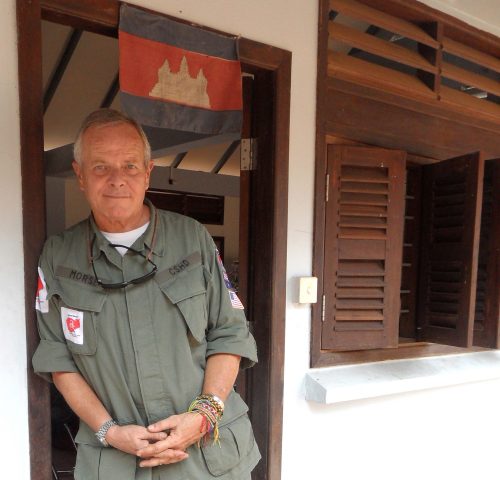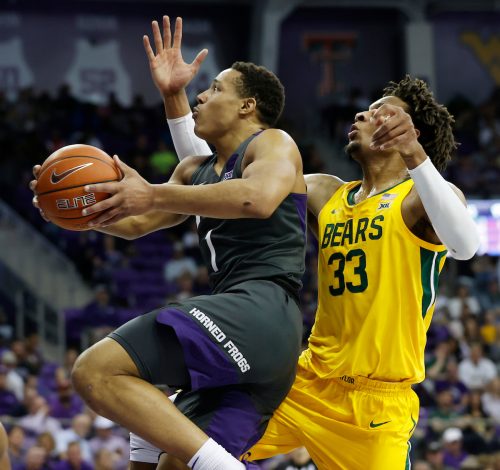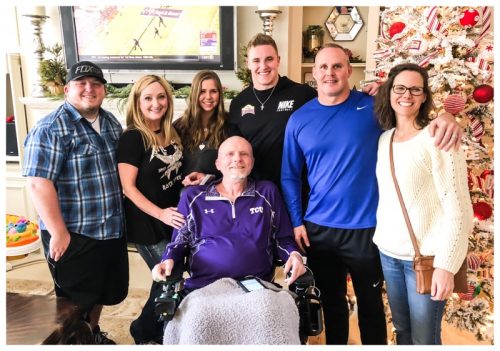In 1999 the CEO of Alcon Laboratories spoke at the spring commencement ceremony, encouraging students to give back to those who helped them.
Terrific Other PeopleS: Repaying in Multiples/A Lifetime Commitment
May 15, 1999
I wish that every one of you could be standing in my central spot in this coliseum and be able to feel the total electricity of excitement that is being generated by this wonderful occasion.
Congratulations. You’ve actually done it. You are now within a few moments of getting your hands on a certificate of graduation — the diploma that you’ve striven so diligently to obtain.
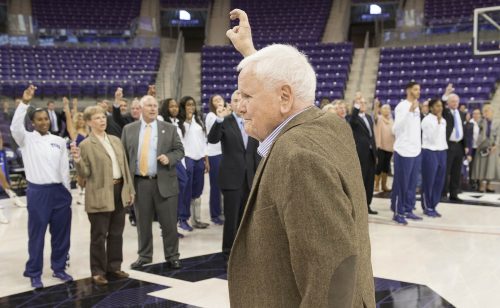
Ed Schollmaier was chairman and CEO of Alcon Laboratories, Inc. in 1999. He and wife Rae provided the naming gift for the Ed and Rae Schollmaier Basketball Practice Complex, which opened in 2004, and the lead gift for the Ed and Rae Schollmaier Arena. Photo by Glen E. Ellman
As that super special moment approaches, I can sense, can actually feel, the variety of emotions that you are experiencing. For many, perhaps all of you, there is a feeling of utter relief. This sensation will alternate with an eagerness to move on to the next phase of your life. Quite possibly, there will be a hint of apprehension about unforeseen difficulties that may be encountered. Beneath the surface, there will repeatedly percolate a well-deserved sense of pride — pride in the significant accomplishment of reaching a major goal in your lives.
Some of you will experience an intermixing of sadness — sadness in realizing that many of the events, disciplines and relationships that brought you comfort and joy are now in your past. In some cases, the deeper sadness of realizing that some loved one who embraced your dream is no longer available to celebrate your success.
These rambling thoughts and many related ones are all perfectly normal. They are, of course, intensified by the emotional energy that this event generates.
Many of you, again possibly all, will have a powerful desire to express thanks — thanks to special friends, thanks to parents, thanks to teachers, and thanks to various individuals who gave a helping hand, advice or encouragement to you along the way. You will be surprised by how many such people — truly deserving thanks — there are already likely to be at this early stage of your life.
During my sixty-five years, there have been dozens of individuals who have shared kindness and support, given a helping hand, and provided a gentle, or not so gentle, nudge in the right direction. Regretfully, there may have been many more that I have failed to notice or have forgotten.
When I was orphaned early in my senior year in high school, the principal, Elmer Kizer, handed me a key to his home. He said to use it if for any reason my options didn’t feel right. Several days later, I found myself on his front porch. In response to my ring, Mrs. Kizer opened the door. “You must be Eddie. Come in and let me show you your room.” I can’t tell you how much I came to love those wonderful people.
Shortly thereafter, the father of a friend arranged an appointment for me with James Shouse, President of WLW-T in Cincinnati. He nodded when I told him that I planned to skip college and attend a radio-:-TVc ourse. Television was in its infancy, and I was eager to get in on the ground floor. Mr. Shouse asked me what I hoped to be doing in fifteen years. I was a little shaky on this but indicated interest in a position similar to Peter Grant, a highly respected news analyst. Mr. Shouse responded that this probably wouldn’t be possible since in fifteen years I would still be ignorant. He urged me to go to college and begin a life long process of pursuing education and an ongoing quest for knowledge and experience.
He promised me a part-time job at the television station to help with expenses and to provide career insights. No sooner had I left his office than I realized that I had been given truly profound advice. The next day I enrolled at the University of Cincinnati.
I could go on and on with examples. Dr. Gertrude Baldwin of Greensboro, Pennsylvania kept a room full of patients waiting while she explained in anger exactly what I needed to begin doing in order to execute my first Alcon job properly. Then she took the time to arrange pharmacy appointments for me so that I got off to a decent start.
There have been literally dozens of such people in my life. All made a significant difference. You, no doubt, have had and will continue to have similar experiences. I refer to these wonderful folks as T-O-PS Terrific Other PeopleS. TOPS, in my opinion, is an extraordinarily appropriate acronym. T-O-P-S, TOPS, Terrific Other PeopleS, TOPS.
When I went to thank Mr. Shouse at the time of my graduation, he said that he was pleased by my expression of appreciation, but, he said, “Not so fast. By acknowledging the usefulness of my aid, you are acknowledging your obligation for repayment. To even the score you must provide similar assistance to twenty other worthy and/or needy individuals that you encounter along the way.” He explained that 20 times was the average financial multiplier or PE ratio for stocks at that time. Simply put, he was recruiting me for membership in TOPS (Terrific Other PeopleS). How could I have refused this challenge?
Likewise, I know that there will be no way for you to refuse as I offer the same challenge to you. The steps are simple. (1) List the TOPS (Terrific Other PeopleS) in your life. (2) Acknowledge your obligation. (3) Promise to pay back, in kind, as opportunities present themselves in the years ahead.
Don’t forget the multiplier. It’s OK to use 20 or 22 times. Yet many stocks today are commanding a 45 to 60 PE ratio. I know that this is a coliseum full of high fliers and that at least a multiplier of 45 times could be used. Don’t let this throw youyou’ve got the rest of your lives to meet your obligation.
Now, let me use the Shouse formula of advanced mathematical extrapolation to illustrate what you have invested in your degrees. At $15,500/year times, let’s say 4 1/2 years, times a 43 PE ratio: You’ve made an investment with a reasonable expected worth of $3 million.
If you’ve received scholarship help, it doesn’t reduce the value of the investment. It merely acknowledges that there were some Terrific Other PeopleS (names perhaps unknown) who stepped up and contributed scholarship funds for your benefit. Whoever they are, you owe them.
These numbers are only the half of it. While you may not be acutely aware of it, each and every one of you received significant financial aid from TCU. To calculate this, you only need to look at the school’s financial statements and note the Annual Fund contributions and Endowment income. What these two items represent are gifts — gifts this year and in the past — from whom? You’ve got it — TOPS, Terrific Other PeopleS.
If you’ve made an investment in your degree worth $3 million, it must be reassuring that Terrific Other PeopleS, TOPS, have doubled the bet on your future by adding another $3 million for a total valued investment of $6 million.
By now you are probably thinking, it looks like you’re going to be in a repayment mode all your life. Well, I hope so. You will be a better and happier person for it. The world will certainly be a better place because of it. Keep in mind that much of this can be done in kind, with kindness, advice, mentoring, and volunteering. Of course, you will also be presented with many opportunities to write checks. Don’t wait to get started. You’ve got a lot of repaying to do, but as Jim Shouse inferred to me, “If you hadn’t received, you wouldn’t owe.”
Consider the full possibilities. If each of us who has been helped helps forty-three others, who in turn each help forty-three others, who in turn each help forty-three others — on and on — the impact on our society will be enormous. Let’s make it happen.
In approaching conclusion, I would like to call special attention to one group of Terrific Other PeopleS that are more readily recognizable to you and many of whom are here today. These TOPS are your parents. They have contributed immeasurably to your being here today and are wonderfully proud of you. Psychologists will tell you that each of you, on average, has one thing for which you have not totally forgiven your parents. Usually this is reflected by withholding or not sharing feelings with them. This could represent resentment for sending you to boarding school or for some similar transgression. I ask that you reflect on this and that you immediately forgive them. Keep them in your lives. Be sure that they know how much you love and appreciate them.
I salute you all. You are now all officially TOPS (Terrific Other PeopleS). You will also shortly be graduates. Hearty congratulations and best wishes.
